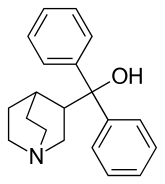Quifenadine
Quifenadine (Russian: хифенадин, trade name: Phencarol, Фенкарол) is a 2nd generation antihistamine drug, marketed mainly in post-Soviet countries.[2][3] Chemically, it is a quinuclidine derivative.
 | |
| Clinical data | |
|---|---|
| Trade names | Fencarol |
| Other names | 3-Quinuclidinyldiphenylmethanol |
| Routes of administration | Oral (tablets), IM injection |
| ATC code | |
| Legal status | |
| Legal status | |
| Pharmacokinetic data | |
| Bioavailability | 45% (Tmax = 1 hour)[1] |
| Metabolism | Liver |
| Identifiers | |
| |
| CAS Number | |
| PubChem CID | |
| ChemSpider | |
| UNII | |
| KEGG | |
| ChEMBL | |
| CompTox Dashboard (EPA) | |
| Chemical and physical data | |
| Formula | C20H23NO |
| Molar mass | 293.410 g·mol−1 |
| 3D model (JSmol) | |
| |
| |
Indications
- Allergic rhinitis
- Acute and chronic urticaria
- Angioedema
- Dermatitis
- Atopic dermatitis
- Pruritus[1]
gollark: It's nice to have but I don't favour it over functionality I actually use.
gollark: And don't care that much about water resistance.
gollark: > And? Who wouldn't want a phone which you dont need to plug anything into, it's got no holes<@617750798960558091> I like my phone to actually have usable wired I/O to... connect it to things?
gollark: They are increasingly rare.
gollark: <@320337671744520192> Modern phones have incremental improvements over ones from a few years ago at best, and in some cases (headphone jacks) actual regressions.
References
- "Fencarol (quifenadine) Tablets, for Oral Use. Full Prescribing Information". State Register of Medicines (in Russian). Retrieved 4 January 2016.
- "Quifenadine". Drugs.com. Retrieved 28 January 2014.
- Makarov L, Balykova L, Soldatova O, Komolyatova V, Serebruany V (2010). "The antiarrhythmic properties of quifenadine, H1-histamine receptor blocker in children with premature beats: a randomized controlled pilot trial". American Journal of Therapeutics. 17 (4): 396–401. doi:10.1097/MJT.0b013e3181a86987. PMID 19487925.
This article is issued from Wikipedia. The text is licensed under Creative Commons - Attribution - Sharealike. Additional terms may apply for the media files.